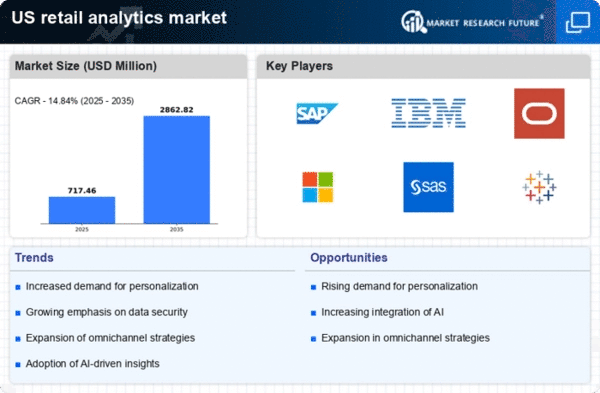Focus on Operational Efficiency
A growing focus on operational efficiency is driving the retail analytics market as retailers strive to streamline their operations and reduce costs. By leveraging analytics, businesses can identify inefficiencies in their supply chains, inventory management, and workforce allocation. This analytical approach enables retailers to make informed decisions that enhance productivity and profitability. Recent studies indicate that retailers utilizing analytics for operational improvements can achieve cost reductions of up to 15%. As the retail landscape becomes increasingly competitive, the emphasis on operational efficiency is expected to propel the demand for retail analytics solutions, fostering market growth.
Expansion of E-commerce Platforms
The expansion of e-commerce platforms is significantly impacting the retail analytics market. As online shopping continues to gain traction, retailers are increasingly turning to analytics to optimize their e-commerce strategies. The ability to analyze online consumer behavior, track sales performance, and manage inventory effectively is becoming essential for success in the digital marketplace. Current data suggests that e-commerce sales in the US are projected to reach $1 trillion by 2025, highlighting the need for robust analytics solutions. Consequently, the retail analytics market is likely to benefit from this trend, as retailers seek to harness data to enhance their online presence and drive sales.
Integration of Advanced Technologies
The integration of advanced technologies such as artificial intelligence (AI) and machine learning is transforming the retail analytics market. Retailers are increasingly adopting these technologies to enhance their analytical capabilities, enabling them to process and analyze data more efficiently. For instance, AI-driven analytics can provide predictive insights that help retailers anticipate market trends and consumer demands. This technological advancement is reflected in the market, where the adoption rate of AI in retail analytics is expected to reach 40% by 2026. As retailers seek to leverage these technologies for competitive advantage, the retail analytics market is likely to witness substantial growth, driven by the need for sophisticated analytical tools.
Rising Importance of Customer Experience
In the retail analytics market, the rising importance of customer experience is a key driver influencing market dynamics. Retailers are increasingly focusing on understanding customer journeys and preferences to enhance satisfaction and loyalty. Data analytics plays a crucial role in this endeavor, allowing retailers to tailor their offerings and marketing strategies to meet customer needs. Reports indicate that retailers who prioritize customer experience see a 60% increase in customer retention rates. As a result, investments in retail analytics solutions that facilitate customer insights are expected to rise, contributing to the overall growth of the market. This trend underscores the necessity for retailers to adopt analytics tools that provide actionable insights into customer behavior.
Growing Demand for Data-Driven Decision Making
The retail analytics market is experiencing a surge in demand for data-driven decision making among retailers. As competition intensifies, businesses are increasingly relying on analytics to gain insights into consumer behavior and preferences. This trend is evidenced by a reported increase in the use of analytics tools, with approximately 70% of retailers indicating that they utilize data analytics to inform their strategies. The ability to analyze vast amounts of data allows retailers to optimize inventory management, enhance customer experiences, and improve sales forecasting. Consequently, the retail analytics market is projected to grow significantly, with estimates suggesting a compound annual growth rate (CAGR) of around 20% over the next five years.

















